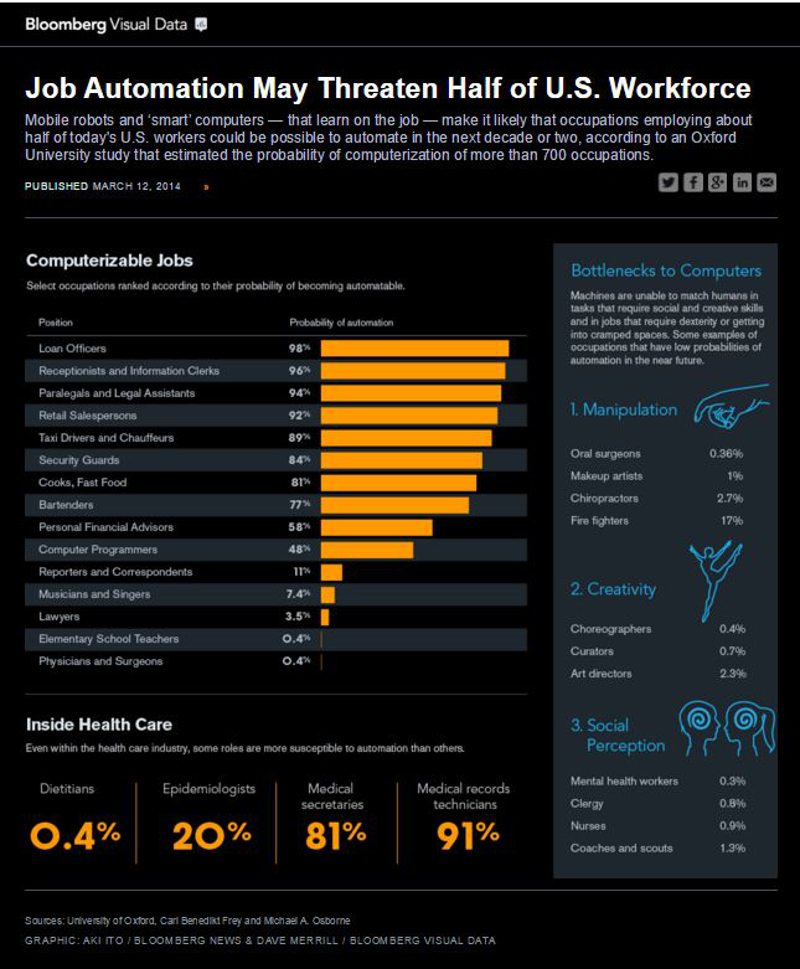Want to stay relevant as machines gradually take over the world? Pick a job that can’t be automated. The work done by humans is getting systematically replaced by devices as time progresses and technology makes new leaps forward. It’s a fact of life that our society is all too familiar with. But there are still plenty of tasks that will be hard to replace by gadgets.
The jobs that machines fumble over are incidentally the same jobs that make life exciting. Choreographers, fire fighters, chiropractors, art directors, coaches, and many others can breathe a sigh of relief knowing that robots won’t render them irrelevant any time soon.
In 2014, Oxford University called these jobs “bottlenecks to computers.” The difficulty behind the decision-making process makes it next to impossible for technology to replace humans in these roles. Still, the research predicts that more than 700 occupations will soon become automated by robots and smart computers that “learn on the job” – a projection that is much harder to dispute given the advent of machine learning, the Internet of Things (IoT), as well as advances in robotics and AI.
Computerizable jobs
Among the professions that stand to be automated in the future, receptionists and salespersons top the list with over 90% probability. The telltale signs are already here. Japan made headlines this year with the Henn-na, the first hotel (supposedly) run by robots. Apple, Google, and Tesla are racing each other to sell the first mass-produced driverless car. The billions poured into this vision are evidence enough that it’s happening, which leaves chauffeurs with an 89% probability of losing their job in the near future.
The bad news doesn’t stop here for those practicing one of the 700 flagged occupations risking replacement by a man-made instrument. Other vocations walking on thin ice include, security guards (84%), cooks (81%), bartenders (77%), advisors (58%) and believe it or not, computer programmers (48%). Okay, now for some good news.
Non-computerizable jobs
In addition to the previously-mentioned “bottlenecks to computers,” there are plenty of other jobs with a very small degree of automation likelihood, and they all have a common perquisite: communication. These include reporters and correspondents (11% probability), musicians and singers (7.4% probability), lawyers (3.5% probability), elementary school teachers (0.4% probability) and physicians (0.4% probability).
It may seems ludicrous that a machine is estimated to fare better as an artist than as as surgeon, but we must remember to take these numbers for what they are: estimates. Still, it can’t hurt to pick a career an industry that is hard to automate. The debate involving machines taking over is not centered on if, but when.

1 Comment
You can post comments in this post.
I don’t think that machines will take over every human job. It is not safe to leave your life in the hands of machines, computers. What if a surgical robot malfunctions during someones brain surgery… ? Just a thought 🙂
However, i’ve heard of automated checkouts already being implemented in high chain supermarkets, were the customers scans his own products and places the money inside the checkout cash register. So there you go, that’s one job that is soon to perish: the good old fashioned cashier.
Paulinho 9 years ago
Post A Reply